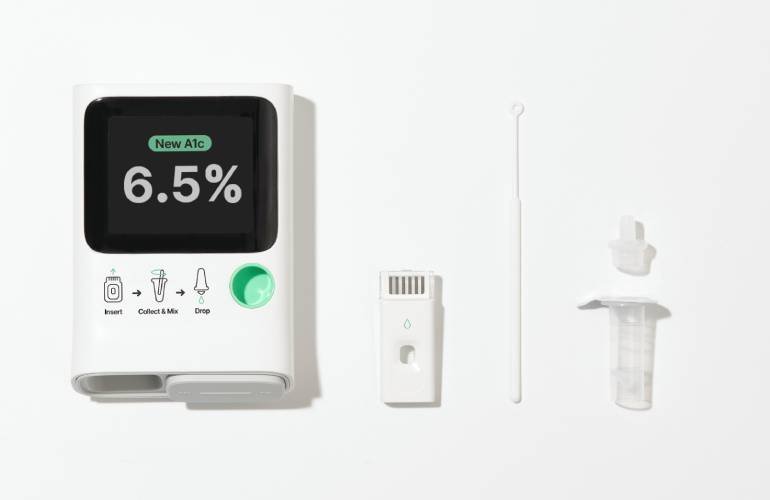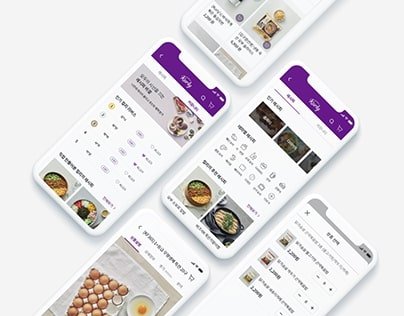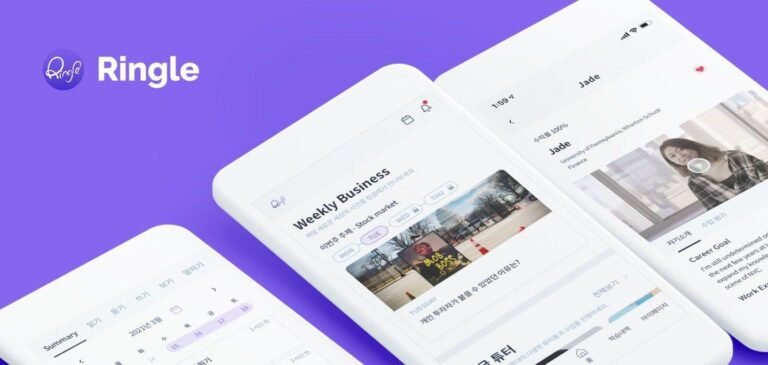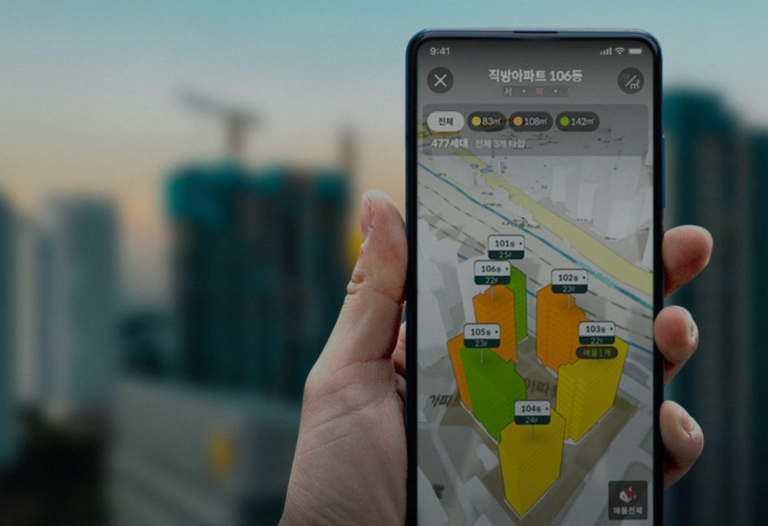Diabetes Tech Startup Launches During COVID–Hits Korea Fortune 40 in Five Years
Diabetes is a silent epidemic across South Korea. A staggering 29.3% of Korean adults aged 65 and older living with the condition. This is a figure expected to rise with an aging population. However, this growing health challenge is paralleled by a surging market opportunity. The South Korean diabetes tech startup market, valued at $470.77 million in 2025, is forecast to grow steadily to $545.77 million by 2030 (source: Mordor Intelligence).
Amid this landscape emerges Orange Biomed, a Seoul-headquartered, Seattle-based tech startup revolutionizing diabetes management through at-home, lab-accurate testing solutions.
Who Are the Diabetes Tech Startup Orange Biomed?
Cofounded by mechanical engineer Unghyeon Ko, along with CEO Yeaseul Park and Luke Jo, Orange Biomed embodies a bold mission. This is: “to bring happiness to the daily lives of those with diabetes.” With headquarters in Seoul and offices in Seattle, the diabetes tech startup strives to make healthcare more accessible and affordable. As a result, they will do this by seamlessly integrating pioneering technology into point-of-care devices.
A core focus of their innovation is the HbA1c test, which measures glycated hemoglobin. This reflects average blood glucose levels over two to three months. Therefore, HbA1c is critical for diagnosing and monitoring both Type 1 and Type 2 diabetes, enabling clinicians and patients alike to adjust treatments and prevent complications.
A Promising Start: Patents and Innovation
Orange Biomed is advancing several promising patents related to their novel approach:
- A U.S. patent for an apparatus measuring glycation of red blood cells using physical and electrical characteristics
- Sample-testing cartridge technology for measuring glycation with enhanced precision
These filings highlight the diabetes tech startup and its leap beyond traditional protein-based HbA1c quantification to innovative single-cell technologies.
Out of the Frying Pan: Founded During COVID
The seeds of Orange Biomed were planted in 2019 when the co-presidents met at Duke University. The COVID-19 pandemic hit the U.S. in 2020 concurrently exposing a painful truth for many diabetes patients: difficulty accessing healthcare amid isolation and social distancing measures.
This sparked the idea to bring state-of-the-art point-of-care (POC) technology directly into patients’ homes. By 2021, Orange Biomed was officially created. The diabetes tech startup successfully developed a prototype by 2022 — the OBM Rapid A1C. It is a portable, accessible, and affordable device designed specifically for at-home diabetes management. Their vision for 2023 and beyond is clear: to make the OBM Rapid A1C a game-changing tool in patient-centered healthcare.
Notable Achievements and Successes
A Drop of Blood, A Wealth of Information
The OBM Rapid A1C transforms traditional HbA1c measurement by analyzing individual red blood cells rather than relying on protein quantification. According to co-founder Unghyeon Ko, this approach “overcomes limitations related to sample volume, temperature, storage, and biological variance”—key issues affecting reliability in home-use tests.
HbA1c remains the gold standard for diabetes diagnosis and management. This is because it reflects long-term glucose exposure, crucial for guiding medication adjustments and preventing complications.
Orange Biomed Lands on Korea Fortune 40
Recognition of Orange Biomed’s innovation came swiftly: In 2025, the company was included in Fortune Korea’s Top 40 Emerging South Korean Healthcare Innovations. This is a prestigious list showcasing Korea’s most promising healthcare startups expanding their global reach. This accolade signals Orange Biomed’s momentum in penetrating the complex U.S. healthcare market.
Improving A1c Readings for BIPOC Communities
Accurate HbA1c measurements have historically been less reliable for Black and other marginalized populations, due to biological factors like longer red blood cell lifespans. Orange Biomed’s technology addresses these discrepancies, offering more precise and equitable testing.
“We focus on empowering people to take control of their own health,” co-founder Luke Jo explained. By enabling accessible, at-home testing, Orange Biomed aims to close critical equity gaps, especially in communities mistrustful of traditional healthcare systems.
Orange Biomed to Showcase at ADCES25 Conference
In August 2025, Orange Biomed will present their OBM Rapid A1C at the Association of Diabetes Care and Education Specialists (ADCES) annual conference. This is one of the world’s largest gatherings with over 2,500 specialists. CEO Yeaseul Park said, “Our microfluidic platform delivers lab-accurate HbA1c results in minutes from minimal blood samples, without protein-based reagents or lab delays.” This visibility will bolster adoption among clinicians and educators dedicated to advancing diabetes care.
A Spike of Diabetes Tech Startup in South Korea
South Korea leads Asia in diabetes device innovation, driven by high demand and government support (Mordor Intelligence). Domestic companies like i-SENS dominate continuous glucose monitoring (CGM). Simultaneously, AI-powered platforms, smart insulin devices, and integrated artificial pancreas systems gain traction.
A Rising Market
- Market value: $470.77 million in 2025, expanding to $545.77 million by 2030
- Annual growth rate: 3.00% CAGR
- Market driven by demographics: 15.5% of adults 30+ affected; rising incidence in younger adults (2.2% among 19-39 years)
Widespread government reimbursement for advanced monitoring devices, including CGMs and insulin pumps, is fueling adoption. At the same time, digital health and 5G connectivity enhance remote care access.
Government Reimbursement and Med-Tech Investments
The National Health Insurance Service (NHIS) extends coverage to reduce out-of-pocket expenses, encouraging usage across age groups. Meanwhile, initiatives like the K-Bio project offer tax credits and expedite reviews, supporting firms such as i-SENS in scaling manufacturing. Such investments boost locally based, cost-effective innovation.
Competitive Landscape
Domestic players like i-SENS and EOFlow are gaining ground despite international competitors like Abbott, Dexcom, and Medtronic. Therefore, Korean startups capitalize on integrated ecosystems, bundling hardware with AI-driven analytics and subscription services to offer holistic diabetes management solutions.
A Tight Squeeze: Where Does Orange Biomed Fit In?
Orange Biomed’s entry into this mature yet evolving market is strategic and timely. Their portable, user-friendly OBM Rapid A1C device aligns perfectly with rising home-care demand and gaps in current HbA1c testing accuracy—especially among diverse populations.
Where Are They Now?
Having raised over $7.5 million (and growing), Orange Biomed is awaiting FDA clearance and preparing for broader U.S. and global market launches, including Korea and Japan. The OBM Rapid A1C’s cutting-edge microfluidic approach distinguishes it as both innovative and pragmatic.
Where Do They Want To Be?
Orange Biomed envisions widespread adoption of their at-home device as a staple in diabetes management, empowering patients and providers with fast, precise, and equitable tools. Future plans include leveraging AI to provide deeper health insights beyond A1c values.
How Are They Revolutionizing Diabetes Healthcare?
By removing barriers to testing accuracy, accessibility, and convenience, Orange Biomed shifts diabetes care toward a proactive, patient-centered model. Crucially, their technology, designed to operate free of protein-based calibration requirements, holds promise for expanding testing to underserved and rural populations, thereby democratizing diabetes management.
Our Insight
South Korea’s dynamic diabetes tech startup industry reflects a broader shift towards integrated, technology-driven healthcare models. Orange Biomed exemplifies this transformation, rooted in pandemic-era innovation and a passionate mission to improve patient lives globally. While traditional clinical models remain vital, startups like Orange Biomed signal a future where home-based, AI-enhanced diagnostics are indispensable, especially in chronic disease management.
This is not just a COVID success story, but potentially a blueprint for the next generation of med-tech innovation emerging from East Asia.
South Korea’s dynamic diabetes tech startup industry reflects a broader shift towards integrated, technology-driven healthcare models. Orange Biomed exemplifies this transformation, rooted in pandemic-era innovation and a passionate mission to improve patient lives globally. Their success demonstrates what can happen when market positioning, and UI/UX development align seamlessly—propelling them from a bold idea to Korea Fortune 40 recognition in just five years.
Frequently Asked Questions
HbA1c, or glycated hemoglobin, measures average blood sugar levels over the past two to three months. It is the gold standard for diagnosing and monitoring both Type 1 and Type 2 diabetes, guiding treatment plans and predicting complication risks.
Orange Biomed is a Korean-American diabetes tech startup founded during the COVID-19 pandemic. They develop innovative portable A1c testing devices using microfluidic technology, targeting accurate, affordable, and accessible diabetes care, especially at home.
Yes. Valued at over $470 million in 2025 and growing steadily, South Korea’s diabetes device market is marked by significant government support, rising prevalence, and strong domestic innovation in CGMs, insulin pumps, and AI-driven platforms.
Their device analyzes single red blood cells and is less affected by protein or hemoglobin variations that can distort readings for certain ethnicities. This results in more accurate and equitable HbA1c measurements, empowering underserved communities with better diagnostics.
Following FDA clearance, Orange Biomed plans to enter the U.S. market first, followed by expansions into the EU, Korea, Japan, and other regions. They aim to integrate AI analytics into their platform to support comprehensive diabetes management solutions.
Orange Biomed stands out as a case study in how thoughtful and strategic market positioning, excellent user experience can create a solution that not only meets patient needs but also communicates its value effectively across diverse healthcare markets.
At BlueWhaleInsight, we specialize in cross-border business development—helping startups refine their positioning, scale their branding internationally, and optimize their customer experience. If you found this insight valuable and face challenges with your own startup growth, don’t hesitate to reach out. We’d be glad to support your journey.






